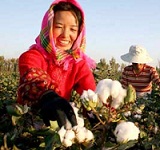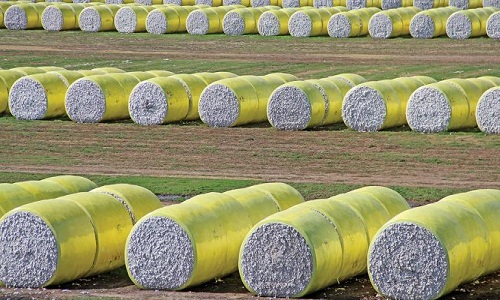"Chinese market for yarn imports has seen a major shift due to two factors. One, lowering of price difference between international and domestic cotton this has made yarn imports less attractive. Further expansion of Xinjiang spinning capacity has made local yarn prices even more competitive due to cost advantages of spinning in Xinjiang. However, yarn imports would continue as still there is a gap in cotton availability in China vis-à-vis the demand. “So, yarn imports are here to stay but price competition would remain intense,” highlights Peter Dong, Birla Jingwei Fibres."

Chinese market for yarn imports has seen a major shift due to two factors. One, lowering of price difference between international and domestic cotton this has made yarn imports less attractive. Further expansion of Xinjiang spinning capacity has made local yarn prices even more competitive due to cost advantages of spinning in Xinjiang. However, yarn imports would continue as still there is a gap in cotton availability in China vis-à-vis the demand. “So, yarn imports are here to stay but price competition would remain intense,” highlights Peter Dong, Birla Jingwei Fibres.
Dealing with adverse situations

China being the dominant textiles market in the world is bound to have an impact on all international business in textiles, according to Dong. Due to increasing costs in China especially for cotton related products, China has shifted more and more to others fibres. Other markets like Vietnam and India are more competitive for Cotton yarns / fabrics now but they are still unable to match the scale and delivery capabilities of China.
“We as the largest viscose player in the world and are catering to specific niches in China market through our products Birla Modal and Birla Spunshades. Lot of yarn capacity in countries such as India, Pakistan etc, was added to serve China demand but with drop in attractiveness of China imports, it is creating extra competition in other parts of the world. At the end of the day, it is a global and interconnected market and China impacts rest of the world in a big way,” emphasises Dong.
Global outlook on cotton
Dong doesn’t expect global yarn production to increase by 3-4 per cent. Cotton yarn production is expected to grow by 2-3 per cent only whereas manmade cellulosic fiber yarns should grow by 6-7 per cent. “Bangladesh would be a growing market but he feels that more yarn needs to be converted to yarn and fabric within local markets itself rather than being exported. Exports are vulnerable to policy changes and government intervention in the form of duties. Vietnam and Indonesia have good spinning capabilities but lack domestic cotton. However, they can import cotton easily from good sources. Vietnam’s demand and supply dynamics in short to long term, as its domestic consumption is increasing. Vietnam has become a major yarn exporter now but that would change as local fabric production increases. Vietnam despite demise of TPP would remain an attractive textiles market in years to come” says Dong.
Expectations from Yarn Expo
“Yarn expo, March 2017 would be the first major textile industry event in Asia and we expect to see good participation from across the industry. 2016 was a volatile year but we finally saw yarn and fabric prices reverse the trend of falling prices and return to a more reasonable level. So, sentiment for 2017 and this event is broadly positive. Further, we expect to interact with our partners in downstream value chain so as to be geared up to meet their requirements in future. We would be mainly highlighting Birla Micro-Modal and Birla Spunshades fibers during this exhibition. While Micro-Modal meets the requirements of softness and addresses the trend towards finer and lighter fabrics.” Birla Spunshades addresses the issues of dyeing related pollution in the textiles industry. Both these products ideally fit the requirements of the industry and we would promote these during the show, remarks Dong.
“We are focussing on increasing visibility of viscose in the markets such as India through initiatives of Liva branding and Liva accredited partner forum. We are also upgrading our product mix towards more specialty fibres such as Modal and spunshades, which are meeting the needs of softness and resource conservation issues in textile industry,” concludes Dong.












